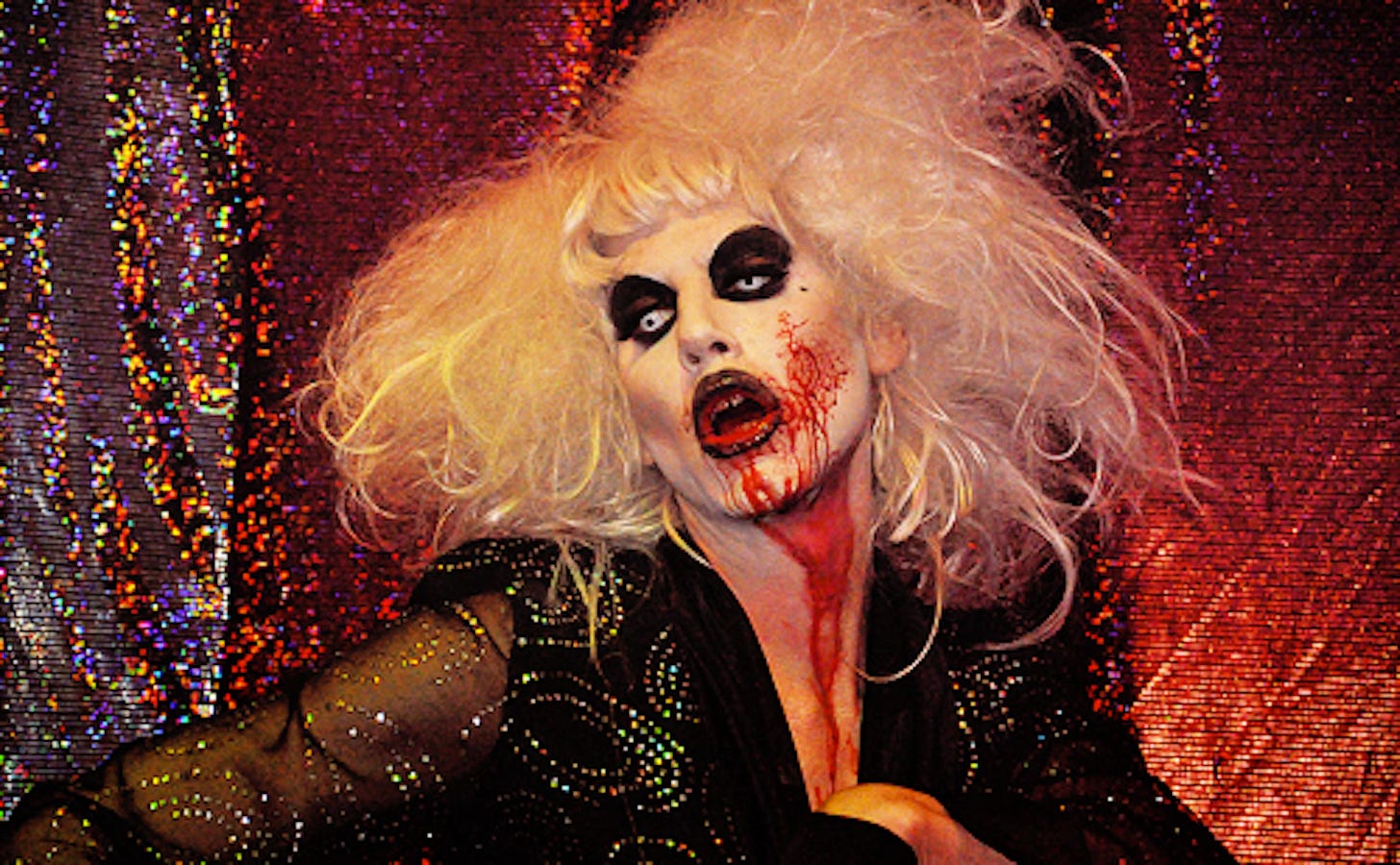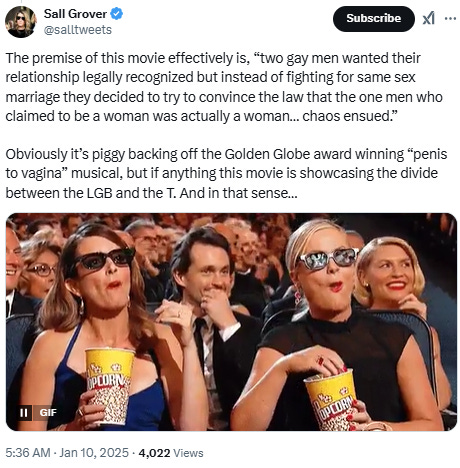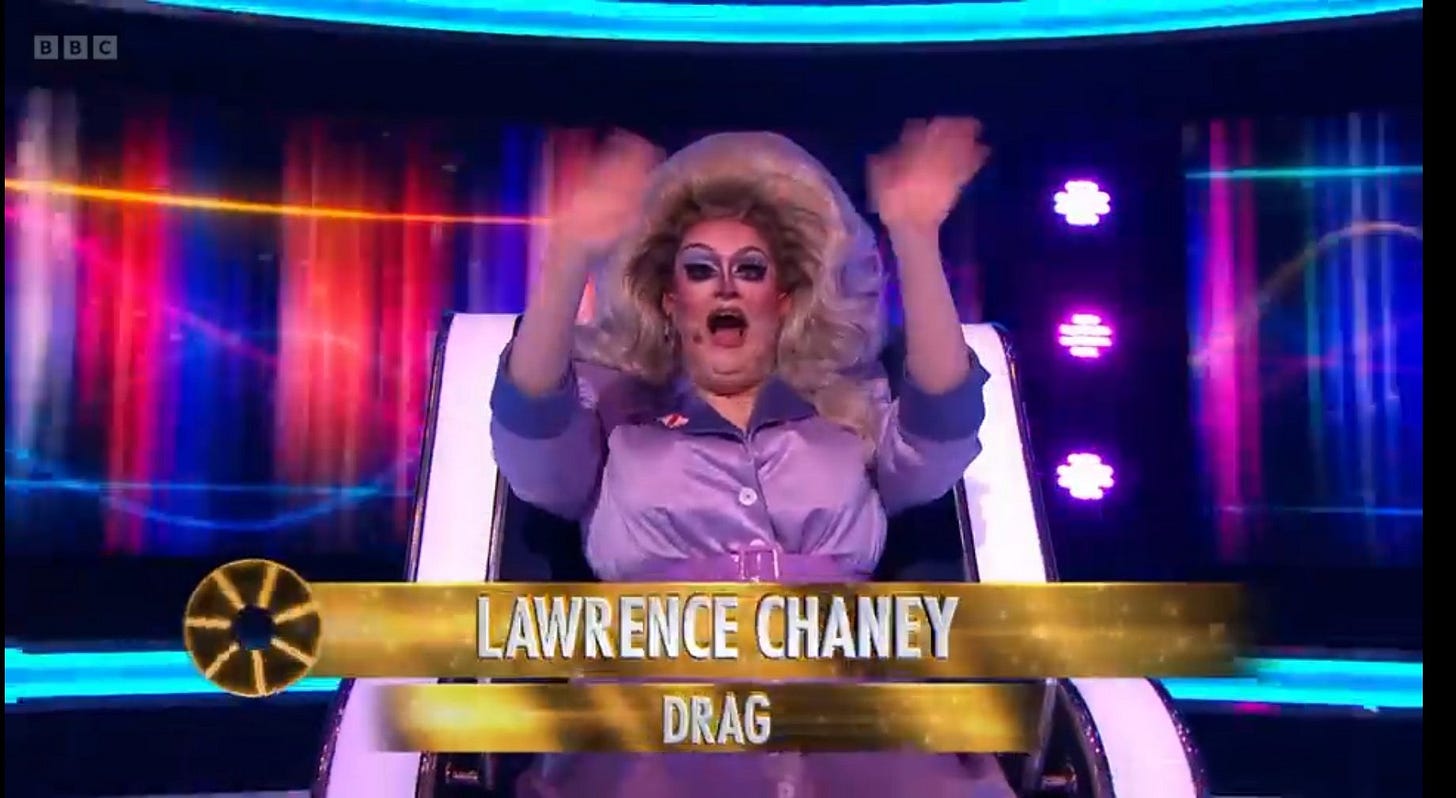The zombie movement still stalking our screens
The trans movement is dying, but no-one seems to have told TV executives
Producing a film generally spans over five years, encompassing everything from initial development to post-production. Given that, we could be in for a lot more men’s rights propaganda in the form of cross-dressing chaps shortly, as the peak gender ideology years were probably about 2018 to 2022.
This disconnect between the entertainment industry and the increasingly sane real world has been laid bare by the fact that the film Emilia Perez, a musical about a transgender drug cartel boss, has won four Golden Globes despite very mixed reviews from both critics and audiences.
In an early scene (below), the gangster reveals to his lawyer that he wants to become a woman. The next scene, which takes the form of a musical number, depicts the lawyer visiting a Thai medical facility to research vaginoplasty and additional cosmetic surgeries available.
Once these operations have been completed, ‘Emilia’ sets about compensating for his violent crimes with saintly activity such as tricking his children into believing he is his own distant cousin to gain access to them. Some of the most vocal opposition to this film has come from LGBTQ media, which objected to the ‘regressive’ portrayal of a ‘transgender woman’ as a duplicitous and violent criminal.
Constant negative responses to ‘transgender’ representation by the very people it is meant to promote should be among the many things that are offputting to companies planning such productions. However, you’d be wrong to assume that the entertainment industry has stopped commissioning this nonsense.
At the end of 2024 it was reported that filming had begun on a new ITV sitcom, Transaction, written by and starring Jordan Gray, about a man pretending to be a woman who works in a supermarket. It is based on six shorts that Gray made a few years earlier, which includes scenes like this.
In 2025, news broke that a movie called 'Hear Me Roar' was in the works. Co-written by Lisa McMullin, a writer for the not-much-missed BBC soap opera Doctors, the film will star Emma Thompson, Anna Friel (who also appeared in the Mermaids propaganda exercise ‘Butterfly’) and Christopher Eccleston. It is based on a true story about a man who married another man in the UK in the 1980s, because he lied to the registrar that he was a woman. By the late 1990s he publicly came clean about the lie and demanded that his marriage still be legally recognised. He didn’t fight for same-sex marriage but instead for the right to create the legal fiction that he was a woman.
Interestingly, the man won his case around the same time that the Gender Recognition Act became law, but almost a full decade before The Marriage Act, which allowed gay couples to marry.
“I’m weeping. It’s profoundly meaningful,” said Thompson, about the premise of the film.
This Christmas, there was no end of transvestite propaganda in the mainstream media, and particularly on the BBC.
Strictly Come Dancing’s Christmas special on Christmas Day was won by Tayce, a drag queen.
Blankety Blank, aired on Boxing Day, featured drag queen The Vivienne as one of the celebrity panelists.
(Tragically, the man playing The Vivienne, James Lee Williams, died a few days later at the age of just 32. This led to several pages of tributes on BBC News. Former US president Jimmy Carter, who died the week before, received just two. The BBC pages about Williams referred to him at different points as ‘he’, ‘she’ and ‘they’, with initial reports suggesting that the person who had died was Williams’ drag queen persona, and not Williams himself.)
Michael McIntyre’s The Wheel, prime time on BBC One on December 28, featured a drag queen as one of the celebrities.
On New Year’s Eve, the BBC broadcast quizzes including Mastermind and University Challenge. Both prominently featured male transvestites.
The new series of Traitors started at the beginning of January, featuring a ‘trans man’ (a woman who believes she is male) as one of the contestants.
It wasn’t just the BBC. Netflix aired the new series Missing You, based on a novel by Harlan Coben, at the start of January, about a young female detective who’s trying to solve her father’s murder. We quickly meet one of her closest friends - a cross-dressing man who is taking part in a ‘girls’ night’ with female friends. In the novel, this character is a recreational transvestite, but the screen adaptation makes it clear he is ‘transgender’, and not only no threat to women but vulnerable to male violence himself.
Meanwhile ITV either aired or had available on ITVX several recent episodes of mainly detective dramas in which a cross-dressing man is shoehorned into the story.
These included:
‘Vera’ (involving the same cross-dressing actor as Missing You), again a victim of male violence which is blamed on the woman who didn’t want to share a women’s hostel with him. Brenda Blethyn’s delivery of the word ‘lass’ in this scene indicates that she struggled as much as the audience with this description.
‘Midsomer Murders’
And Irvine Welsh's ‘Crime’.
Notably, Crime and Midsomer Murders also include what must be some of the first explicit on-screen portayals of TERFs or gender critical women. Both characters appear as humourless, uptight older women who are dressed more traditionally than their cross-dressing nemeses and ultimately object to freedom of expression on the vaguest of grounds. Irvine Welsh even has his emotionally incontinent self-insert detective character deliver a speech to his gender-critical sister about why we should “all be a bit more tolerant”. In contrast, the audience is told repeatedly that the two ‘transgender’ or cross-dressing characters are progressive, enlightened and wise, despite all appearances to the contrary.
While the murder of the gender-critical woman in Midsomer Murders is in keeping with the flippant style of the show, her death from injuries caused by a stiletto to the head and an over-tightened corset, after which her corpse is dressed in an approximation of drag, feels particularly venomous on the part of the writers. The decision of programme-makers to promote inclusivity over good writing and acting ability has not gone unnoticed by viewers, with the drag episode of Midsomer Murders claiming the lowest IMDB audience rating of the series, and one of the lowest for the show as a whole. The second series of Crime was far more negatively reviewed than the first, with even the Guardian admitting that 'much of the dialogue feels superfluous and didactic.'
The BBC’s autumn 2024 offering included two drag-based comedies: Ginger’s House, an adult-themed comedy chat show with a set surely designed with children in mind, and the drag sitcom, Smoggie Queens.
The latter should act as a warning to anyone wanting to promote drag or gender ideology over good quality writing and acting. Despite being well-promoted and widely reviewed, it failed to find an audience, dropping from just 41,000 viewers in its first episode to, incredibly, only 30,000 viewers for its second. You might think there would be no room for didacticism and moralising in a half hour ‘out-and-out slapstick sitcom’, but most episodes managed to include a scene in which the, admittedly weak, comedy stopped dead and a lesson about the importance of rejecting blood relatives for ‘chosen family’ ensued.
If this recent glut of womanface (with the exception of a solitary ‘trans man’) and the promise of future gender propaganda in the entertainment industry is all a bit depressing, it’s worth remembering that nowhere is more captured by this ideology than the arts. The exciting news that Graham Linehan is writing comedy again is reason to hope that sanity will prevail again soon.





"Some of the most vocal opposition to this film has come from LGBTQ media, which objected to the ‘regressive’ portrayal of a ‘transgender woman’ as a duplicitous and violent criminal."
Or maybe (go with me on this), just maybe, it's that "transgender women" are a mixture of the mentally ill and predatory men who can't believe anyone would be stupid enough to let them have access to kids if they say the magic words.
It takes at least months, usually years, for a project to go through the entire production pipeline. Most of the entertainment content you are seeing on TV and movie screens today started out as projects in 2022 or 2023. One might add to this list "Captain America IV," an imminent bomb for Disney Marvel that tripled in budget due to emergency reshoots to replace overly-woke scenes that test audiences hated. A depressing amount of cultural pollution will continue to spew out of the pipeline for a while, and even the corporations that are trying to alter course are having a hard time of it.